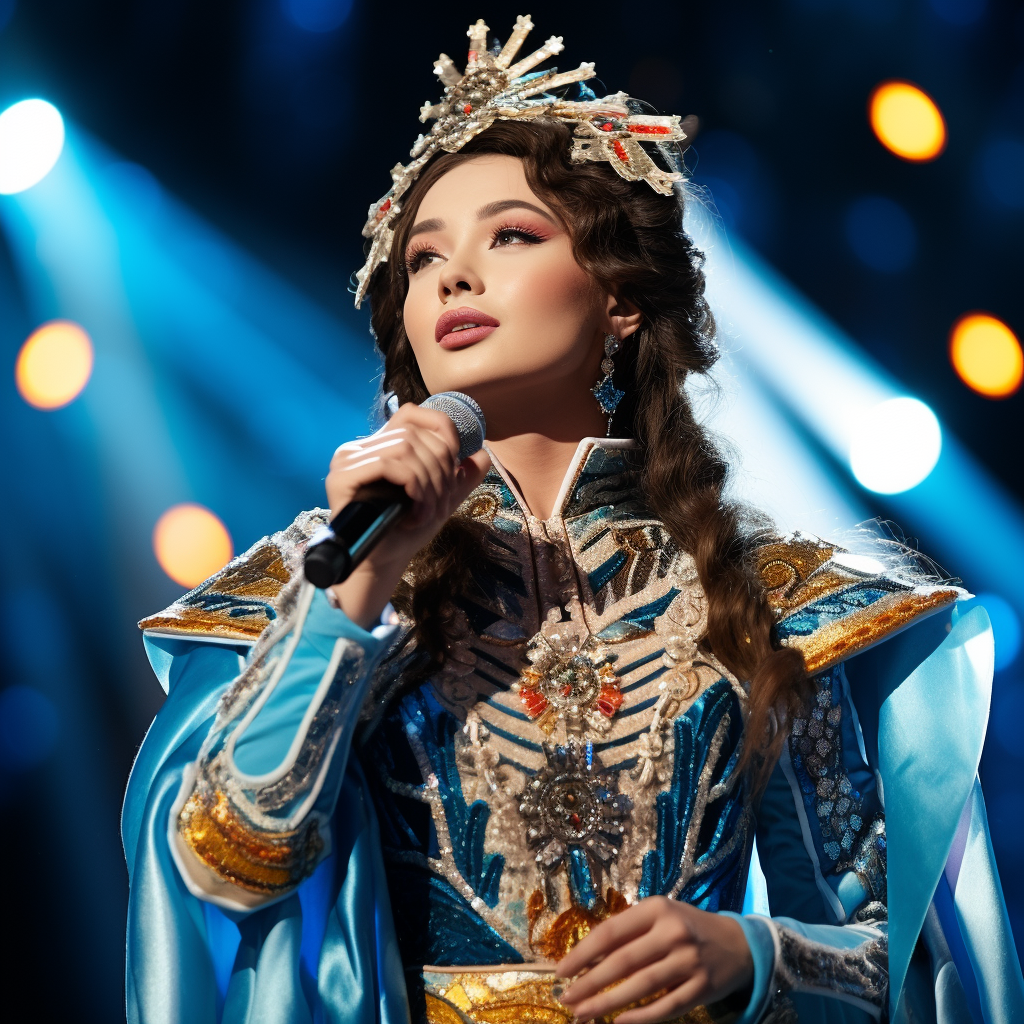In Kazakh language present continuous is expressed with help of verbs отыр (sit), жатыр (lay), тұр (stay, to be on), жүр (go).
ып/іп/п+отыр/жатыр/тұр/жүр construction is used to form present continuous tense.
For example,
Мен жазып отырмын.=I am writing
Сендер ойнап жүрсіңдер.=You are playing.
Олар тамақ пісіріп жатыр.=They are cooking.
In these examples auxiliary verbs serve as -ing ending in English.
Depending on the context you should choose between these four auxiliary verbs. As such they can be chosen according to the length of period you are engaged in this or that activity.
Тұр
- is used for short lasting activities such as сөйлеу (talk), ашу (open), беру (give);
- is used when someone is doing an activity while staying. When someone is in a standing position while doing something he/she tries to finish it faster.
- cannot be used with activities not performed in a standing position, like to айдау (drive), жүгіру (run), құлау (fall).
For example,
Мен сөйлеп тұрмын.=I am talking.
Сен ұялып тұрсың.=You are feeling shy.
Сіз біліп тұрсыз.=You know it.
Отыр
- is used for activities which you do while sitting;
- is used only for people, not for objects or animals;
- is used when you are dedicated to doing something for a longer time than while staying;
- cannot be used with activities not performed in a sitting position, like жүгіру (run), жату (lay), ұшу (fly), жүзу (swim).
For example,
Ол күліп отыр.=He/She is laughing.
Біз сезіп отырмыз.=We are sensing/feeling.
Сендер жек көріп отырсыңдар.=You hate it.
Жүр
- is used for actions which are lasting for a specific period of time in the present. But those actions may not be happening at the moment of speaking. These actions are true for the current present time. For this category we may list verbs such as дайындалу (get ready), оқу (study), үйрену (learn), бару (go).
- depending on the context some sentences with жүр can be translated as present perfect continuous (have been V+ing) tense sentences.
For example,
Ол дайындалып жүр.=He/She is getting ready/preparing.
Біз оқып жүрміз.=We are studying/We have been studying.
Сендер үйреніп жүрсіңдер.=You are learning.
Сіздер барып жүрсіздер.=You are going to...
Жатыр
- is used for the actions, which are going on at the moment of speaking, and which can last for a longer period than with other options.
- Sometimes it can be used interchangeably with жүр option, for the actions a person is involved in general. For example the sentence Ол оқып жатыр might mean either that he is reading right now or that he is busy with reading something for the recent period. The meaning of a sentence can be identified by context.
For example,
Ол дайындалып жатыр.=He/She is getting ready/preparing. (right now he/she is busy with this)
Біз оқып жатырмыз.=We are studying. (right now)
Сендер үйреніп жатырсыңдар.=You are learning. (right now)
Сіздер тамақ пісіріп жатырсыздар.=You are cooking. (right now)
Compare:
- Мен жазып тұрмын.=I am writing right now (But I will not be doing this for a long period. I will finish it very soon. This is not a regular action.)
- Мен жазып отырмын=I am writing. (This option may be used when you are doing this activity while sitting and you are dedicated to do it for a longer time than while staying.)
- Мен жазып жүрмін.=I am writing./I have been writing (I have been engaged with this activity from the very recent past and doing it regularly. Maybe I started taking notes of some lectures only last week, because of taking a course from then and I am going to do it on a regular basis now. But I am not busy with writing at the moment of speaking about it.)
- Мен жазып жатырмын.=I am writing/I have been writing (The action is happening at the moment of speaking and you are fully busy with this activity/I am busy with this activity from the recent past on a regular basis).
Exercise 1. Conjugate the following verbs in нақ осы шақ (present continuous or present perfect continuous). Think in each sentence which of auxiliary it is best to use. If you can use more than one option of an auxiliary verb, analyse how they would be different in their meaning.
1. Мен (ұшу). 2. Сен (көру). 3. Біз (жазу). 4. Сендер (сату). 5. Сіз (кесу). 6. 7. Ол (ұту). 8. Олар (салу). 9. Сіздер (айту). 10. Мен (тыңдау).
Exercise 2.
Make up your own 2 sentences with тұр, 2 sentences with отыр, 2 sentences with жүр, 2 sentences with жатыр in нақ осы шақ (present continuous or present perfect continuous). Then read your examples to class to discuss your ideas with each other.



Grammar
Нақ осы шақ I -Present Continuous I
Нақ осы шақ I -Present Continuous I
Қоғамдық орындарда коммуникацияға қатысу: театрда.
